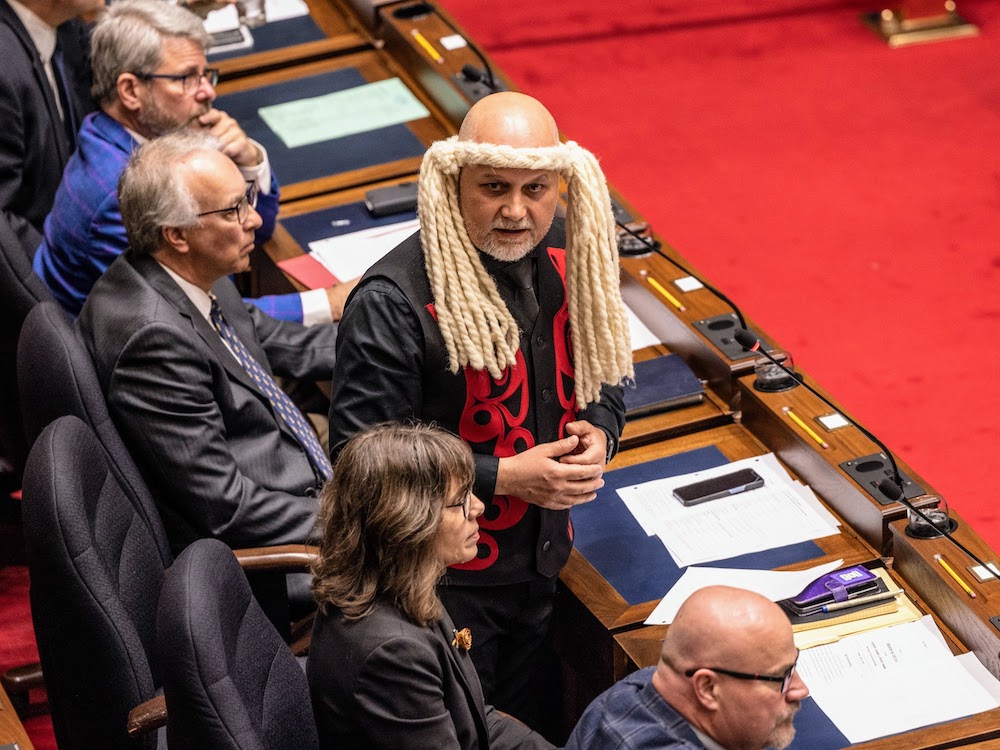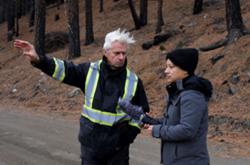As the bill to recognize the Haida Nation’s title to Haida Gwaii moves through the B.C. legislature, it will have the full support of the BC Green Party.
“This is a policy of recognition,” said Adam Olsen, the MLA for Saanich North and the Islands. “We should be proud of that in this province, that we now have a government that is acknowledging and recognizing Indigenous people rather than forcing them into courts to defend their existence.”
He expressed disappointment at the response to Bill 25, the Haida Nation Recognition Amendment Act, 2024, from BC United and Conservative party politicians in the days after the government introduced it April 22 in the legislature.
“They’ve been very quick to criticize this government’s approach, demanding pauses and delay tactics... and they’ve not put any ideas forward as to how they would do something different and the reality is that without that we have a long future of litigation in front of us,” said Olsen, who is a member of the Tsartlip First Nation north of Victoria.
“We have clearly two parties on the political right that have decided they are going to continue in the theory of rights denial rather than rights recognition, and that should be very much of concern to British Columbians.”
Haida Gwaii includes around 10,000 square kilometres on some 200 islands about 100 kilometres west of B.C.’s north coast. The islands have been under colonial rule for the last 150 years, but home to the Haida for at least 13,000.
The bill recognizing Aboriginal title is the latest step in a process that goes back to at least 2002, when the Council of the Haida Nation filed a title claim in the Supreme Court of British Columbia, a claim that the court has never heard.
It follows the signing earlier in April of the Gaayhllxid/Gíihlagalgang “Rising Tide” Haida Title Lands Agreement between the province and the Haida.
Provincial officials have said that along with recognizing Haida Aboriginal title to Haida Gwaii, the agreement and the supporting legislation provide for a staged transition to Haida jurisdiction while maintaining private property rights and existing government services and infrastructure.
Conservative Party of BC Leader John Rustad expressed support for title and the bill on first reading in the legislature, then a day later warned on X that the government “is undermining YOUR private property rights” and may be on the way to applying Aboriginal title to all of the province. “This is a mess,” he wrote.
Rustad followed with a statement saying he’d learned more about the bill after its introduction. “I fully support resolving Haida’s title claim but including private land is reckless and exposes the people of B.C. to an incredible liability risk,” he said.
“Our province is home to 204 First Nations who claim between 110 to 120 per cent of all land in B.C. as traditional territory. [Premier David] Eby’s Haida deal sets a precedent that as it plays out across the province, could cost B.C. taxpayers or private landowners trillions of dollars.”
BC United Leader Kevin Falcon was absent from the legislature the day the bill was introduced, but Michael Lee, the party’s critic for Indigenous relations and reconciliation, expressed caution about it. Falcon and Lee later released a statement calling on the government to delay passing the bill until after October’s provincial election.
“We have considerable concerns regarding the current NDP government’s approach with Bill 25, which not only introduces more uncertainty but also risks escalating conflicts,” the statement said. “Bill 25 exemplifies the NDP’s pattern of enacting major legislative changes without sufficient consultation and transparency, undermining public trust and the principles of good governance.”
Olsen said slowing down the process at this point makes little sense and would likely lead to the same outcome since neither of the other opposition parties are proposing practical alternatives. The agreement was negotiated over a long period of time between elected provincial officials and Haida representatives, he added.
“I’d like to hear what the process is from both the BC United and the B.C. Conservatives, what their process is,” he said. “How are you going to do this differently?”
The most likely result would be more court cases, Olsen said. “As an institution, if we want to be creating the certainty that my colleagues in the opposition are claiming we want, then we want to be sitting at a table, not sitting in a courtroom, because we basically hand all the certainty over to the courts at that point.”
Going to court is best avoided, said Olsen. “It’s a very long, messy and oftentimes very emotional process for Indigenous people to continue to have to defend their existence over and over and over again.... I’ve had family members go through that process. It’s very dehumanizing.”
Reaching an agreement like the government has with the Haida is more humane, he said. “It doesn’t require an Indigenous people to have to go into court and hear awful things about themselves. It doesn’t require a First Nation to go into court to hear their government arguing against them, maybe even their personhood.”
Olsen criticized Rustad’s change of direction and said some of the Conservative leader’s statements were misleading.
It is wrong, for example, to suggest the bill creates a liability for the province, Olsen said. “The liability exists. It’s the reason why we’re doing this. It’s the reason why the courts have said do this through agreement, not through the courts.”
He gave the example of the Nuchatlaht case in which the Supreme Court of BC last week recognized the Vancouver Island nation’s Aboriginal title to part of its territory.
“The reality is the Canadian court system has told us that we have a responsibility as elected officials to deal with this in a mature way,” he said, “to come to agreements with First Nations. That’s exactly what happened in the Haida case.”
Despite opposition parties fanning fears, signing agreements like the one with the Haida will in fact provide more certainty, Olsen said. “Let’s get to the table, let’s have these agreements.... It’s frustrating to see the leaders of the other parties divide British Columbians just as they’ve done consistently on this issue since before this session even started.”
Olsen said Falcon should have been at the legislature for the Haida bill’s introduction. “It is completely inexplicable to me that the leader of the official Opposition wasn’t here to welcome our guests into this house,” he said. “That is clearly not the kind of leadership we need to have in governments going forward in this province.”
Falcon told The Tyee he received little advance notice of the government’s plans and had already scheduled a town hall meeting in Burnaby. “I was already committed to go to that, and so it would have been quite inappropriate to cancel that at that late hour.”
The bill the government introduced will have significant impacts and should be taken slowly, Falcon said.
“This is a government bill that is proposing to extend some pretty sweeping changes including private property rights to now come under the Haida,” he said. “It is very important for the public to have the opportunity, and the opposition, quite frankly, to have the opportunity to understand what are the implications of those very far-reaching changes going to mean, not just in Haida, but 203 other bands right across this province.”
Delaying passage of the bill would give everyone time to look at it and provide informed input, Falcon said. “They do this in a very sneaky underhanded kind of way where they just present it and bring it forward without the opportunity for broad public consultation, not just with the Haida, but broadly speaking with the public at large.”
Significant changes need to have proper discussion and debate, he said.
“In the absence of doing that, I would argue, they are at risk of setting back reconciliation because, remember, reconciliation is not just with First Nations; it’s with Indigenous and non-Indigenous peoples to make sure that we’re walking down that path together, understanding clearly what the benefits and risks and trade-offs are in any proposed piece of legislation.”
The government started second reading of the bill on Wednesday.
“This important milestone creates stability for everyone on Haida Gwaii, an orderly step-by-step path forward to implement Haida Aboriginal title,” Indigenous Relations and Reconciliation Minister Murray Rankin said in the legislature.
The recognition of Aboriginal title in the agreement does not take away anyone’s private property rights, Rankin said. “Sadly, there are some who live far from Haida Gwaii who seek to divide and use this important work for political aims, to sow fears that pit people who live in British Columbia against each other.” ![]()
Read more: Indigenous, Rights + Justice, BC Politics

















Tyee Commenting Guidelines
Comments that violate guidelines risk being deleted, and violations may result in a temporary or permanent user ban. Maintain the spirit of good conversation to stay in the discussion and be patient with moderators. Comments are reviewed regularly but not in real time.
Do:
Do not: